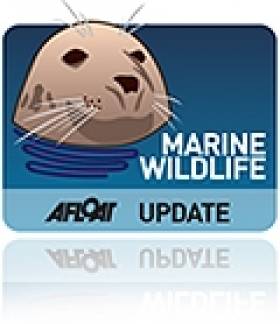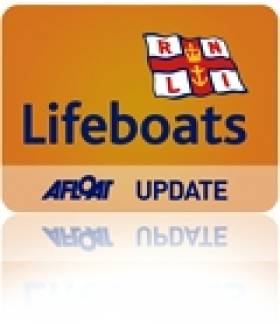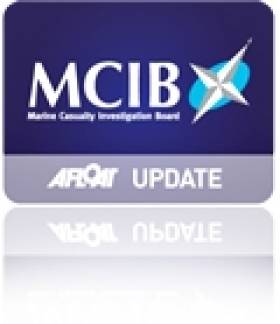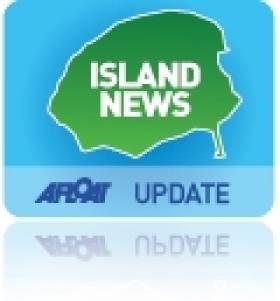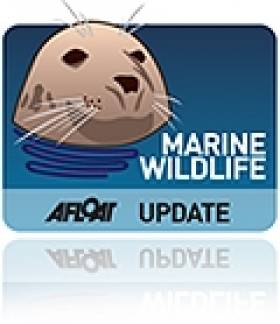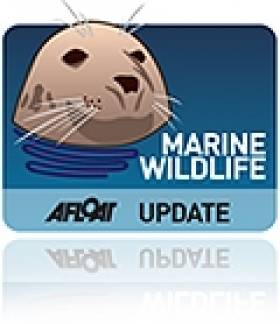Displaying items by tag: Achill Island
Recent Dolphin, Whale Strandings 'Very Unusual' Says IWDG
#MarineWildlife - The Irish Whale and Dolphin Group (IWDG) has described as "very unusual" a mass stranding of common dolphins on Achill Island last week - which was followed this week by the remains of cetaceans washed up in Kerry.
At least eight common dolphins were found dead on Keel Beach, Keem Beach and Dookinella on the Co Mayo island at the end of January.
And The Irish Times reports that two pilot whales and an "otherwise healthy" dolphin were found washed up at Cuas Croom near Cahirciveen in the last few days.
Commenting on the former incident, IWDG stranding officer Mick O'Connell said: "While there are occasionally live strandings involving groups of dolphins, it is very unusual in this country to see this number of dead dolphins washed ashore over a 10km area."
Strandings of deceased dolphins have also been reported in Donegal, and the IWDG's Simon Berrow suggests that the recent severe weather experienced around Ireland's coast may be a factor.
Lifeboat Crews Tow Vessel From Rocks Off Waterford
#Lifeboats - TheJournal.ie reports that RNLI lifeboat crews from Dunmore East and Fethard rescued two fishermen from their vessel off the Waterford coast yesterday (14 January 2013).
Rescuers sped to the scene after the 10-metre fishing boat got into difficulty and grounded close to the shore north of Loftus Hall.
Despite the receding tide, the lifeboats managed to tow the vessel carefully off the rocks "without any major damage", according to a spokesperson. The two crew were uninjured in the incident.
It marked the third major call-out in a week off the Waterford coast - following a similar rescue effort last Tuesday, and just days after the tragic loss of a local fisherman on Thursday morning on the sixth anniversary of the sinking of Dunmore East trawler the Pere Charles.
Meanwhile, on Sunday afternoon volunteers with Achill Island RNLI went to the assistance of an injured fisherman off the Mayo coast.
The lifeboat station received the distress call around noon to go to the assistance of a fishing party north of Clare Island, where the crew removed a man from the vessel who had suffered an eye injury from a fishing hook.
He was subsequently transported on the lifeboat to Kildavnet, where a local doctor examined his injury before referring him to Castlebar General Hospital for further attention.
Achill Island Attracts Kitesurfers The World Over
#Kitesurfing - “There’s loads of special places in the world, but none of them are Achill,” says kitesurfing instructor Francois Colussi. “There’s something magical here.”
And if this article from TNT Magazine is anything to go by, you'll be sure to agree.
The writer recently spent a short break on the weather-worn but ruggedly beautiful island in Co Mayo that has in recent years become a winter haven for kitesurfers the world over - drawn to the winds and waves that made it the perfect choice to host the Aer Lingus Kite Surf Pro in October.
Those are the same qualities that brought in Frenchman Colussi, who has since turned a former local pub near Keel beach into kitesurfing school Pure Magic.
Indeed, you don’t have to be a professional to kitesurf in Keel. “It’s one of the most extreme sports, but the most accessible. It’s much easier that surfing or windsurfing. You can learn in a weekend,” Colussi tells TNT. “You don’t need huge upper body strength – you’re powered by the wind.”
Even so, at this time of year it's a place for the hardier souls, as Welsh world champ Kirsty Jones describes: “The ocean is pure, Atlantic water. You feel a slap in the face like – Yes! I’m alive!”
TNT Magazine has more on the story HERE.
Overboard Recovery Systems Recommended After Achill Trawler Drowning
#MCIB - The Marine Casualty Investigation Board (MCIB) has recommended the use of man overboard recovery systems on board fishing vessels after the death of a crewman on the MFV Mark Amay II off Achill Island last year.
Cathal McDaid drowned after being carried overboard from the four-man fishing trawler when he stumbled on the boat's launching net while crossing the deck on the morning of 10 May 2011.
The MCIB report found that McDaid apparently lost his safety helmet and hit his head either on the stern ramp as he was being carried over, or against the hull of the vessel while in the water, possibly rendering him unconscious - which explains why efforts by the crew to throw him a lifebelt proved fruitless.
The situation was compounded by McDaid's choice of personal flotation device. Though he was wearing a PFD on deck, as were all crew members, it was of the waistcoat kind without a collar "that will not turn the wearer onto his back and keep his head out of the water".
Had he been wearing such a collar, it would have "significantly reduced the likelihood of his drowning".
Conditions at the time of the incident were also very poor, with force 5 to 6 south-easterly winds and seas of up to 5 metres, with the vessel pitching severely, which made it impossible for the crew to put a wire line around McDaid and hoist him aboard.
He was instead pulled into the vessel's liferaft, where fellow crew Charles McDaid and Joáo da Silva alternately administered CPR to little avail.
The crew contacted Malin Head Coast Guard, which tasked the Sligo-based Rescue 118 helicopter to the scene, some 52 nautical miles west of Achill Beg.
The Irish Coast Guard aircraft arrived some 90 minutes later and winched Cathal McDaid aboard, flying him directly to a waiting ambulance at Sligo Airport, where he was pronounced dead on arrival.
In its official report into the incident, the MCIB noted that McDaid had been standing on the deck against the established safety rule for the vessel's crew that no standing on the trawl deck is permitted when the net is being shot.
It also found that had his safety helmet been properly secured, it may have prevented the blow to the head from rendering him unconscious, and that had be been equipped with a safety harness it may have stopped him from being dragged overboard by the net when he fell on deck.
The most significant conclusion, however, was that no formal arrangement was in place on the Mark Amay II to recover a crewman from the water.
To this end, the MCIB recommends that "a proprietary type of man overboard recovery system, such as the Jonbuoy MOB Recovery Module or similar be available on board and that all crew are trained in its use". It is also recommended that the Minister for Transport consider issuing a marine notice to that effect.
The full report on the Mark Amay II incident is available to download via the link below.
Kite Surf Pro Kicks Off in Achill Today
#KITESURFING - Ten days of top-class kitesurfing action kick off today (19 October) on Achill Island at the Aer Lingus Kite Surf Pro.
Some 36 riders from 19 countries have converged on Galway Bay to tackle the cold Atlantic waters in what marks the first time the tour has been hosted in Ireland.
As previously reported on Afloat.ie, current world number one Patri McLaughlin will be looking to retain his tour lead in the coming days, but may face a stiff challenge from local wildcard entrants Ryan Coote and Keith McGewon.
Meanwhile, local female wildcard Jade O'Connor will join a field topped by championship leader Ninja Bichler from Germany.
The contest is the penultimate stop on the KSP World Tour for 2012, and will be streamed live online via the official tour website.
It will operate with a mobile format, with riders based at the Pure Magic Lodge on the island and heading out to whatever spot produces the best possible combination of wind and waves on any given day.
#ISLAND NEWS - The latest Marine Notice from the Department of Transport, Tourism and Sport (DTTAS) outlines the reinstatement of passage for boats through Achill Sound in Co Mayo.
Passage will be subject to the following procedures that Mayo County Council have put in place in relation to the opening of the Achill Sound Bridge:
Mayo County Council will require a minimum of two working days’ notice to open the bridge (contact [email protected] or call 097 81004 between 9am-1pm and 2pm-5pm Monday to Friday to give the required notice).
Opening will be dependent on weather conditions.
Opening shall be at high water and between the hours of 9am and 3.30pm (Monday-Thursday) and 9am-2.30pm on Friday. Opening outside these hours and on public holidays will only take place in exceptional circumstances.
As a result of the changes outlined in Marine Notice No 24 of 2012, the directions of Marine Notice No 36 of 2010 are now superseded.
Rare Stranding of Minke Whale on Achill Island
#MARINE WILDLIFE - A minke whale died shortly after washing ashore in what was a rare stranding on Achill Island last week, according to Mayo News.
The whale, reportedly and eight-metre adult male, was discovered beached on Keel beach last Tuesday 17 April, It was the first recorded stranding of a whale on Achill Island in over 20 years.
It was followed by reports of a second whale stranded on Annagh Strand on the north side of the island, though full details are unclear as the tide returned the animal to the sea.
“We can’t say why the whale came ashore or how it died,” said Orla Calvel of the Irish Whale and Dolphin Group (IWDG). “It was not an old whale, as it was very clean – older whales would have barnacles on them."
The IWDG retrieved a tissue sample from the carcass for DNA purposes to record the stranding.
Humpback Whale Spotted Off Achill
#MARINE WILDLIFE - The Irish Whale and Dolphin Group has confirmed the sighting of a humpback whale off Achill Island in Co Mayo last weekend.
Surfers off Keel Beach were credited with the discovery, after spotting a large whale of 30-60ft breaking the surface multiple times, lifting its tail fluke vertically.
The sighting is only the fifth validated record of a humpback whale off the coastal area from Galway to Donegal.
"It remains something of a mystery as to why sightings of this species remain such relatively rare events along our west and northwest compared to our south and southwest coasts," says IWDG sightings co-ordinator Pádraig Whooley.
"This latest sighting is a timely reminder that species such as humpbacks can and do turn up in places that are well outside what we perceive to be the known 'hotspots'."
Humpback whales tend to feed in inshore waters, which should make them increasingly easier for the public to spot from the shore, he added.
The IWDG has more on the story HERE.


























